Retro Replay Review
Gameplay
Rogue Trip: Vacation 2012 thrusts you into the driver’s seat of a weaponized taxi in a bombastic twist on the classic car-combat genre. From the very first level, you’ll jockey one of 16 fully customizable vehicles—each with its own handling quirks and upgrade paths—through a post-apocalyptic wasteland teeming with hazards and rival drivers. Your primary objective is simple yet relentless: secure and protect a single passenger, deliver them to photogenic landmarks, and rake in cash to bolster your arsenal and repair your ride.
(HEY YOU!! We hope you enjoy! We try not to run ads. So basically, this is a very expensive hobby running this site. Please consider joining us for updates, forums, and more. Network w/ us to make some cash or friends while retro gaming, and you can win some free retro games for posting. Okay, carry on 👍)
The core loop rewards aggressive, strategic play. You’ll barrel through busy highways, weave between debris fields, and confront enemy cabbies bent on hijacking your fare. Power-ups scattered across the map—ranging from speed boosts to missile salvos—add moments of exhilaration. Timing your pickups at designated “photo-op” spots flips the risk-reward dial: linger too long for a big payout, and you become a magnet for attackers; bolt off too soon, and you leave money on the pavement.
One of Rogue Trip’s biggest strengths is the pacing of its progression. Early missions acclimate you to basic combat maneuvers: ramming, side-hanging mines, and turret fire. As you unlock heavier weaponry—flamethrowers, homing rockets, even a deployable minefield—the tactics deepen. Juggling offensive strikes, evasive drifts, and hit-and-run retreats creates a satisfying high-octane ballet, especially when dozens of AI opponents clamor for the same fare.
Graphics
For a title originally released in the late ’90s, Rogue Trip holds up remarkably well. The polygonal car models exhibit crisp edges and distinct silhouettes, making it easy to identify friend, foe, or neutral vehicle at a glance. While texture resolution occasionally dips into the blocky territory, the vibrant color palettes—scorched deserts, neon-lit cityscapes, rusted industrial zones—keep each environment visually distinct and engaging.
Environmental hazards add a dynamic flair to the graphics. Watching a jumbo jet descend for an emergency landing only inches from your bumper injects a true sense of danger—and the sandstorms that periodically obscure your vision force you to rely on audio cues and mini-map awareness. Explosions, smoke plumes, and debris particles are surprisingly detailed for their era, and you’ll often find yourself pausing momentarily just to admire the chaos you’ve unleashed.
The user interface adopts a clean, HUD-centric approach: a succinct speedometer, weapon-status indicators, and a minimap that tracks both your passenger’s location and hostile vehicles. The result is a minimal distraction from the onslaught of action, ensuring your focus remains on orchestrating the perfect vehicular ambush or executing that last-second dodge around a collapsing overpass.
Story
Unlike narrative-heavy racers, Rogue Trip offers a delightfully tongue-in-cheek premise rather than a sprawling saga. The overarching plot is simple: in a world decimated by an unnamed cataclysm, tourism has become the most dangerous gig in town. You play as one of several potential drivers, each with their own quips and back-stories unlocked via brief in-game cutscenes—and while these vignettes are short, they’re peppered with dark humor that sets the tone for each mission.
Passengers themselves range from thrill-seeking daredevils to oblivious vacationers, providing colorful commentary as you careen through the wasteland. Their dialogue is delivered in staccato bursts between explosive chaos, creating a comedic counterpoint to the relentless combat. Though the story doesn’t evolve in sweeping arcs, these character interactions give the game an unexpected charm, making you care just enough about your fare to protect them at all costs.
The lack of a deep narrative might deter players seeking JRPG-style world-building, but for those who prefer action over exposition, Rogue Trip’s storytelling is perfectly pitched. Each stage offers a fresh “mission briefing” that hints at localized lore—abandoned resorts, overrun shopping malls, and sunken highways—that fuels your imagination and underscores the world’s bleak yet bizarrely entertaining setting.
Overall Experience
Rogue Trip: Vacation 2012 stands out as a riveting blend of vehicular combat and arcade-style pick-up-and-play design. Its addictive upgrade system encourages you to return after each mission, eager to spend your hard-earned cash on beefier armor, faster engines, or more destructive weapons. With 16 cars to master and a host of secret items to discover, the game delivers solid replay value for completionists and newcomers alike.
Complementing the driving mayhem is a pulse-pounding soundtrack courtesy of The Mighty Mighty Bosstones and Nashville Pussy. Their high-energy tracks underscore every crash, explosion, and turbo-boosted sprint, turning each level into a head-banging joyride. Audio cues—like the whine of incoming rockets or the roar of a rival’s engine—also play a critical tactical role, enhancing immersion and keeping adrenaline levels sky-high.
While the absence of modern online multiplayer might feel limiting, Rogue Trip’s split-screen mode offers equally competitive face-offs for two players, reviving the couch-based rivalry of classic arcade racers. Even today, there’s nothing quite like elbow-to-elbow duels to settle who truly reigns supreme in post-apocalyptic taxi warfare. In sum, Rogue Trip delivers an unforgettable, unrepentantly over-the-top ride that any fan of vehicular combat should add to their collection.
 Retro Replay Retro Replay gaming reviews, news, emulation, geek stuff and more!
Retro Replay Retro Replay gaming reviews, news, emulation, geek stuff and more!
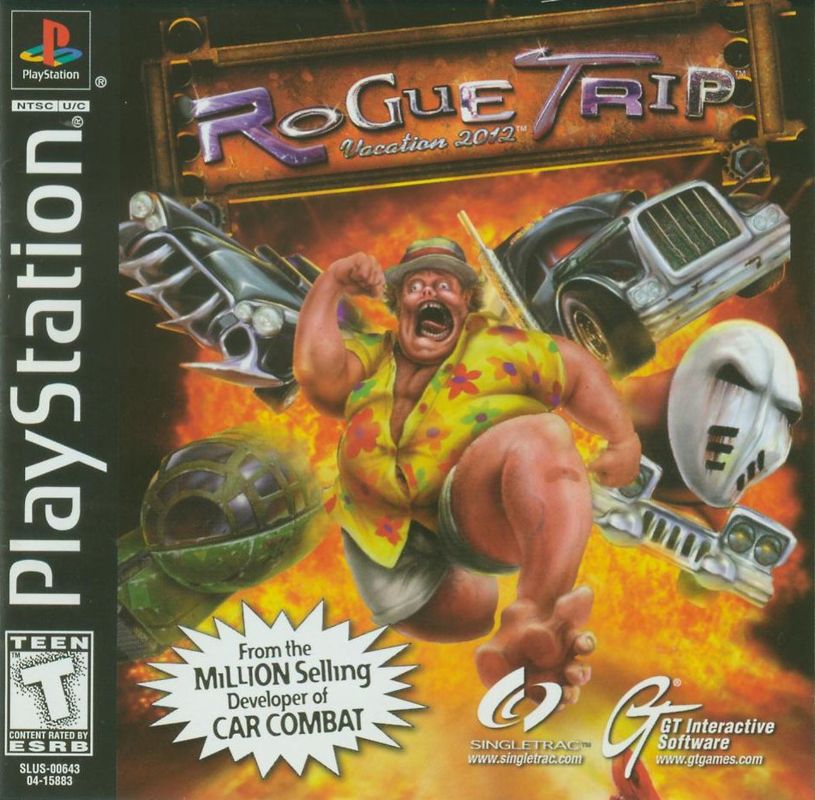
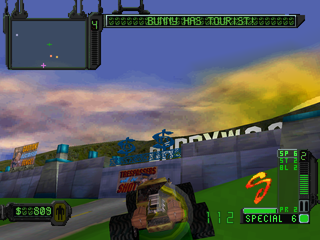
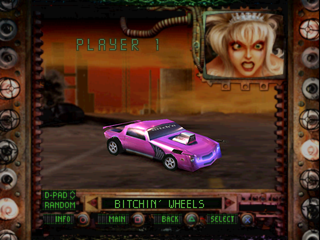
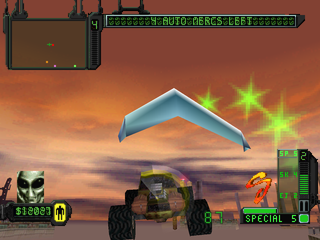

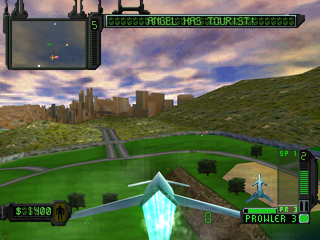

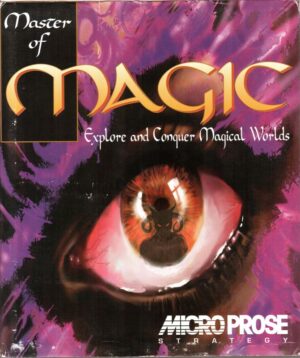

Reviews
There are no reviews yet.